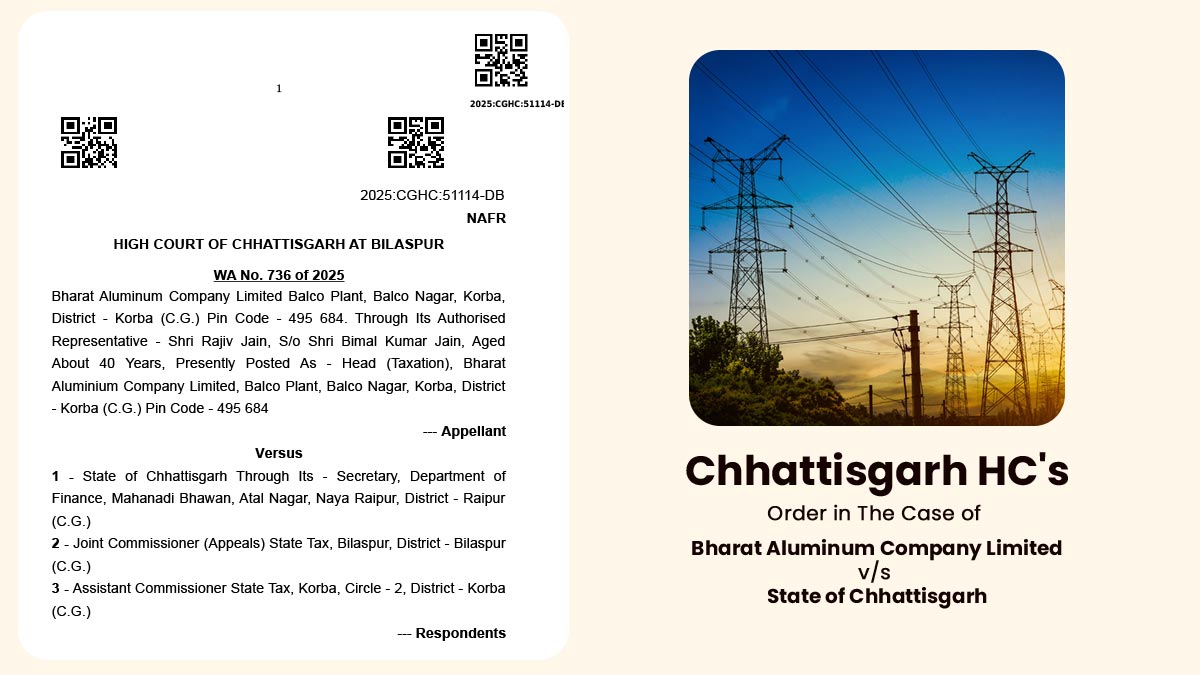
The Chhattisgarh High Court has made a significant ruling concerning Bharat Aluminium Company Limited (BALCO) regarding Input Tax Credit (ITC) on Compensation Cess related to imported coal.
The court dismissed BALCO’s appeal, stating that the ITC for Compensation Cess is not permissible for electricity generated and supplied to an employee township. The judgment emphasises that this particular activity does not meet the criteria of being conducted in the course or furtherance of business as defined by the Central Goods and Services Tax (CGST) Act, 2017.
Bharat Aluminium Company Limited (BALCO), located in Korba, Chhattisgarh, specialises in the production of aluminium products. The company operates its own captive power plants and sources coal through imports, which incurs a GST Compensation Cess.
The electricity generated by these power plants serves multiple purposes: it is utilised in the manufacturing process, sold to State Electricity Boards, and partially allocated to a residential township that accommodates BALCO’s employees. The core issue at hand pertains to the Input Tax Credit (ITC) claim for the Compensation Cess associated with the electricity provided to this residential township.
For the refund of the ITC of Rs 7,44,73,347 for February 2019, Balco has submitted an application. The refund has been rejected by the tax authorities to the extent of Rs 51,48,531, keeping that the electricity supplied before the township was not appropriate for ITC.
The Joint Commissioner (Appeals) kept the same decision. BALCO is dissatisfied with this and submitted writ petitions, which were dismissed via a learned Single Judge by a common order dated 31.07.2025, leading to the present intra-court appeals.
Mr Bharat Raichandani, the counsel of the appellant, claimed that keeping the township and supplying electricity was an activity “in the course or furtherance of business” under Sections 2(17) and 16(1) of the CGST Act, and is crucial for housing skilled personnel in a remote area and ensuring uninterrupted manufacturing.
The individual presented a case asserting that the amendment to Explanation 1(d) of Rule 43 of the CGST Rules, which was introduced by GST Notification No. 14/2022, is intended to be clarificatory in nature. As a result, he argued that it should be applied retroactively. Additionally, he pointed out that the order issued by the Single Judge lacked detailed reasoning and did not sufficiently take into account the arguments presented or the pertinent legal precedents.
Opposite to that, the appeals have been countered by Mr Rahul Tamaskar, learned Government Advocate for the respondents. According to him, supplying electricity to a residential township is a welfare activity, not directly connected to the core business of manufacturing.
He relied on Supreme Court judgments in Maruti Suzuki Ltd. v. CCE and Gujarat Narmada Fertilizers Co. Ltd. v. CCE, claiming that ITC is a concession available merely for the electricity utilised in the factory for confined consumption instead of electricity “wheeled out” for external purposes. Also, he said that the revision to Rule 43 was prospective and not retrospective, as Section 164(3) of the CGST Act was not invoked.
After considering the rival submissions, the Division Bench of Chief Justice Ramesh Sinha and Justice Ravindra Kumar Agrawal framed two key questions for determination: (i) whether supplying electricity to the township is “in the course or furtherance of business”; and (ii) whether the amendment to Rule 43 is retrospective.
While confirming the decision of the Single Judge, the court held that ITC is a regulatory concession and not a substantive right. It put reliance on the decisions of the Apex court in Maruti Suzuki and Gujarat Narmada Fertilisers to conclude that ITC is not considered for electricity supplied externally for residential consumption, as it is not used within the factory for manufacturing. The Court found the precedents cited by the appellant irrelevant to the case’s facts.
Read Also: Upcoming 57th GST Council Meeting: Ease of Compliance & Policies
The Court concurred with the Single Judge regarding the retrospectivity of the amendment. It was determined that the addition of Explanation 1(d) to Rule 43 simply broadened the definition of exempt supplies and was not intended to clarify existing provisions. Since the rule-making authority did not designate the amendment as retrospective under Section 164(3), it was ruled to be prospective, applying only from July 5, 2022.
All the writ appeals filed by BALCO have been dismissed by the court and confirmed the common order of the Single Judge. It held that the supply of electricity to the township was not “in the course or furtherance of business” and that the revision to the CGST Rules could not be applied retrospectively. No order was passed as to costs.
| Case Title | Bharat Aluminum Company Limited vs. State of Chhattisgarh |
| Case No. | WA No. 736 of 2025 |
| For Appellant | Mr Bharat Raichandani & Mr K. Rohan |
| For Respondents | Mr. Rahul Tamaskar |
| Chhattisgarh High Court | Read Order |








